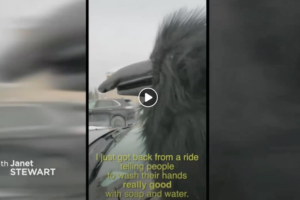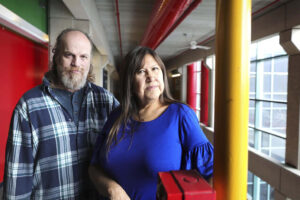Press Release
FOR IMMEDIATE RELEASE
Friday, March 6, 2020
Dr. Stéphane McLachlan, of the University of Manitoba, was announced today as a successful recipient of $500,000 in research funding as part of the Canadian 2019 Novel Coronavirus (COVID-19) Rapid Research Funding Opportunity competition. The Government of Canada announced the competition on February 5, 2020. Only 47 of the 227 submitted projects across Canada were successful.
Stephane McLachlan, PhD – Principal Investigator on Project
“In a matter of a week, a remarkable diversity of Indigenous communities and organizations joined this project as partners, in part reflecting the great need for such a project but also reflecting an active desire to take a leadership role in how COVID-19 might be better managed moving forward.”
“kitatipithitamak mithwayawin: Indigenous-Led Planning and Responses to Coronavirus (COVID-19) and other Pandemics Then, Now, and Into the Future” is a two-year project that will evaluate the implications of past and existing countermeasures to pandemics with respect to Indigenous communities across Canada and address any gaps in understanding and support related to COVID-19 and other pandemics into the future. This project will bring together academic researchers, community health organizations, and traditional knowledge holders.
Elder David Scott, Swan Lake First Nation – Co-Applicant
“If history has taught science anything about how disease has affected Indigenous peoples, it will have learnt that western scientific methodologies do not always have the answers for our people. It is essential that this study clearly identifies the concerns and anxieties of those that can potentially be affected by disease and to understand the difficult circumstances in each of our communities. Doing so will help us make well informed decisions about our health and wellbeing.”
This collaborative project will focus on the past by documenting experiences with other pandemics and explore changes in response over time. It will focus on the present by assessing the current state of community emergency planning and risk communication. Finally, it will focus on the future by assessing community responses to different possible scenarios and ideas for moving forward.
Gail Braun, RN – Collaborator
“Research on this topic must be expedited to create a plan to protect vulnerable populations. My hope would be that the research would further highlight the importance of clean water access, address overcrowding and accommodate more appropriate health care that addresses body, mind, spirit and emotional needs.”
The outcomes will be shared with Indigenous communities and organizations across Canada, all levels of governments, and the general public so that the health interests of Indigenous peoples are best served now and into the future.
Myrle Ballard, PhD – Co-Applicant
“When the pandemic passes, this research will be a great tool for documenting ‘lessons learned’ that will be used for First Nations organizations, health care providers, and policy- and decision-makers”
These activities will be conducted through the Wa Ni Ska Tan: Alliance of Hydro-Impacted Communities, made up of over 24 First Nations and Métis communities, 23 researchers from nine universities, and 25 partner organizations.
Niki Ashton, MP-NDP, Churchill—Keewatinook Aski – Partner
“As the Government of Canada grapples with preparing for COVID-19, the First Nations and researchers making up the Wa Ni Ska Tan Project have made it clear that there must be urgent and particular attention given to First Nations people. We cannot repeat the horrific patterns of the past. First Nations in Manitoba and across the country must be supported and protected urgently.”
Stephane McLachlan, PhD – PI on Project
“Past responses to pandemics have often created more harm than good when it comes to impacted Indigenous communities. Our intent is to finally flip this narrative on its head.”
Media Contacts:
Dr. Stephane McLachlan – (204) 293-4500
Elder Dave Scott – (204) 208-0264
Dr. Myrle Ballard – (204) 474-6230
Other Quotes:
Elder David Scott, Swan Lake First Nation
“Our knowledge and experiences with disease are easily dismissed by western scientific methodologies. This study will describe what happened, to who, and what were the consequences.”
“The primary advantage of this study gives indigenous people an opportunity to share our knowledge and experiences and will assist our people in making informed decisions about our own wellbeing.”
Stephane McLachlan, PhD – PI on Project
“Past experiences with pandemics including H1N1 show that Indigenous communities have suffered much more than other Canadians.
This project will mitigate any such impacts associated with COVID-19, in large part by working closely with these communities and Indigenous organizations when developing effective and culturally appropriate countermeasures.”
“Indigenous communities across Canada, and for that matter around the world, have been devastated by other pandemics. Our intent is to stop repeating the same mistakes over and over again. Instead, we will use COVIID-19 as an opportunity to promote self-determination and affect positive change regarding pandemics and more generally health and health care as it relates to Indigenous communities.”
“By taking a collaborative approach, our intent is to build on the experiences and strengths of Indigenous communities and organizations in finally developing effective countermeasures now and into the future.”
“This project in part focuses on the past, by documenting previous Indigenous experiences with other pandemics; on the present by assessing and building on existing capacity to respond; and on the future by exploring ways that western science and Indigenous culture can both be used to mitigate any anticipated harm.”
“This project is proactive in that it will work closely with Indigenous communities and organizations in anticipating and mitigating any future harm associated with COVID-19. And it is even more notable in that it foregrounds the strengths and experiences of these partners in times of fear and stress regarding this emerging pandemic.”
“When it comes to the growing fear and concern regarding COVID-19, it is hard to imagine any positive news. Well this project and the way it affirms and builds on the experiences and strengths of Indigenous communities and organizations regarding other pandemics is one such example of good news.”
Myrle Ballard, PhD – Co-Applicant
“This research will learn how First Nations dealt with Pandemics in the past and how they coped”
“The timeliness of this research aligns with what First Nation communities are doing in preparation for a major pandemic”



